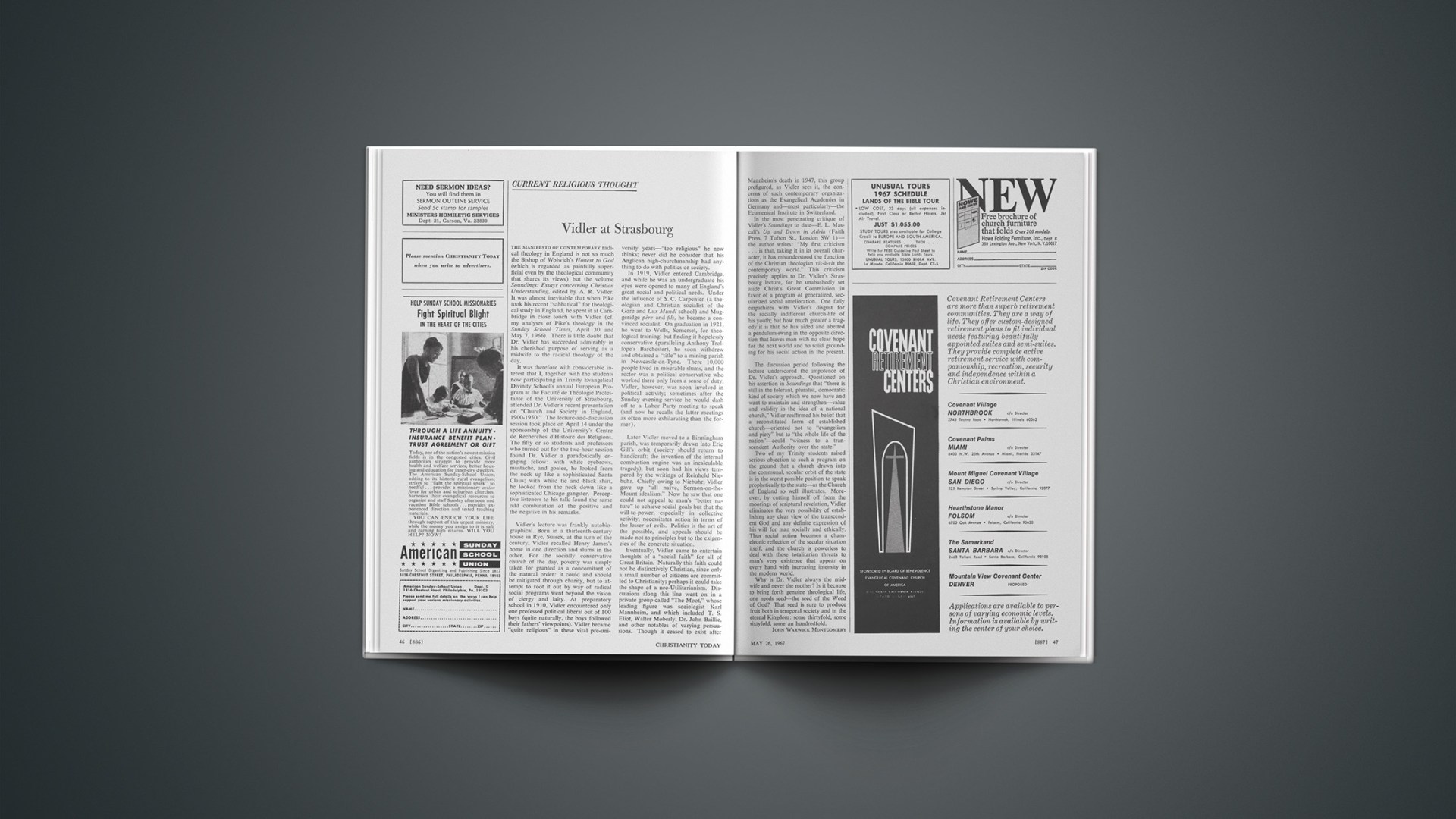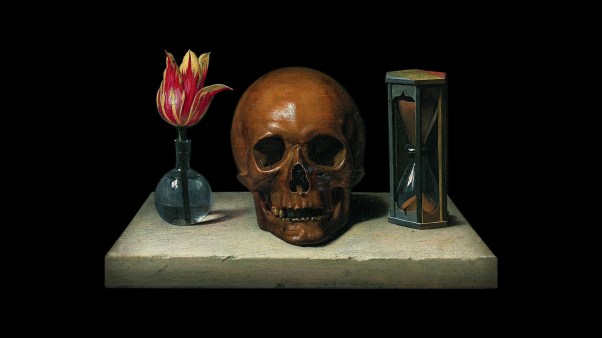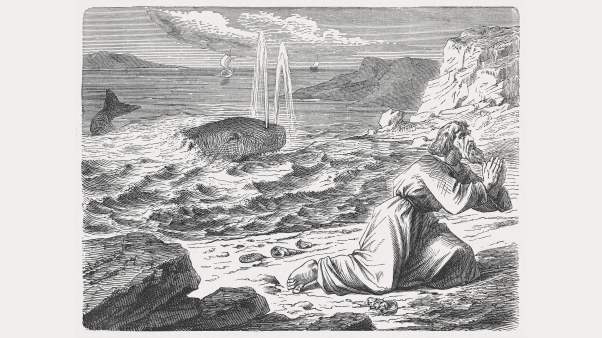The manifesto of contemporary radical theology in England is not so much the Bishop of Wolwich’s Honest to God (which is regarded as painfully superficial even by the theological community that shares its views) but the volume Soundings: Essays concerning Christian Understanding, edited by A. R. Vidler. It was almost inevitable that when Pike took his recent “sabbatical” for theological study in England, he spent it at Cambridge in close touch with Vidler (cf. my analyses of Pike’s theology in the Sunday School Times, April 30 and May 7, 1966). There is little doubt that Dr. Vidler has succeeded admirably in his cherished purpose of serving as a midwife to the radical theology of the day.
It was therefore with considerable interest that I, together with the students now participating in Trinity Evangelical Divinity School’s annual European Program at the Faculté de Théologie Protestante of the University of Strasbourg, attended Dr. Vidler’s recent presentation on “Church and Society in England, 1900–1950.” The lecture-and-discussion session took place on April 14 under the sponsorship of the University’s Centre de Recherches d’Histoire des Religions. The fifty or so students and professors who turned out for the two-hour session found Dr. Vidler a paradoxically engaging fellow: with white eyebrows, mustache, and goatee, he looked from the neck up like a sophisticated Santa Claus; with white tie and black shirt, he looked from the neck down like a sophisticated Chicago gangster. Perceptive listeners to his talk found the same odd combination of the positive and the negative in his remarks.
Vidler’s lecture was frankly autobiographical. Born in a thirteenth-century house in Rye, Sussex, at the turn of the century, Vidler recalled Henry James’s home in one direction and slums in the other. For the socially conservative church of the day, poverty was simply taken for granted as a concomitant of the natural order: it could and should be mitigated through charity, but to attempt to root it out by way of radical social programs went beyond the vision of clergy and laity. At preparatory school in 1910, Vidler encountered only one professed political liberal out of 100 boys (quite naturally, the boys followed their fathers’ viewpoints). Vidler became “quite religious” in these vital pre-university years—“too religious” he now thinks; never did he consider that his Anglican high-churchmanship had anything to do with politics or society.
In 1919, Vidler entered Cambridge, and while he was an undergraduate his eyes were opened to many of England’s great social and political needs. Under the influence of S. C. Carpenter (a theologian and Christian socialist of the Gore and Lux Mundi school) and Muggeridge pere and fils, he became a convinced socialist. On graduation in 1921, he went to Wells, Somerset, for theological training; but finding it hopelessly conservative (paralleling Anthony Trollope’s Barchester), he soon withdrew and obtained a “title” to a mining parish in Newcastle-on-Tyne. There 10,000 people lived in miserable slums, and the rector was a political conservative who worked there only from a sense of duty. Vidler, however, was soon involved in political activity; sometimes after the Sunday evening service he would dash off to a Labor Party meeting to speak (and now he recalls the latter meetings as often more exhilarating than the former).
Later Vidler moved to a Birmingham parish, was temporarily drawn into Eric Gill’s orbit (society should return to handicraft; the invention of the internal combustion engine was an incalculable tragedy), but soon had his views tempered by the writings of Reinhold Niebuhr. Chiefly owing to Niebuhr, Vidler gave up “all naïve, Sermon-on-the-Mount idealism.” Now he saw that one could not appeal to man’s “better nature” to achieve social goals but that the will-to-power, especially in collective activity, necessitates action in terms of the lesser of evils. Politics is the art of the possible, and appeals should be made not to principles but to the exigencies of the concrete situation.
Eventually, Vidler came to entertain thoughts of a “social faith” for all of Great Britain. Naturally this faith could not be distinctively Christian, since only a small number of citizens are committed to Christianity; perhaps it could take the shape of a neo-Utilitarianism. Discussions along this line went on in a private group called “The Moot,” whose leading figure was sociologist Karl Mannheim, and which included T. S. Eliot, Walter Moberly, Dr. John Baillie, and other notables of varying persuasions. Though it ceased to exist after Mannheim’s death in 1947, this group prefigured, as Vidler sees it, the concerns of such contemporary organizations as the Evangelical Academies in Germany and—most particularly—the Ecumenical Institute in Switzerland.
In the most penetrating critique of Vidler’s Soundings to date—E. L. Mascall’s Up and Down in Adria (Faith Press, 7 Tufton St., London SW 1)—the author writes: “My first criticism … is that, taking it in its overall character, it has misunderstood the function of the Christian theologian vis-à-vis the contemporary world.” This criticism precisely applies to Dr. Vidler’s Strasbourg lecture, for he unabashedly set aside Christ’s Great Commission in favor of a program of generalized, secularized social amelioration. One fully empathizes with Vidler’s disgust for the socially indifferent church-life of his youth; but how much greater a tragedy it is that he has aided and abetted a pendulum-swing in the opposite direction that leaves man with no clear hope for the next world and no solid grounding for his social action in the present.
The discussion period following the lecture underscored the impotence of Dr. Vidler’s approach. Questioned on his assertion in Soundings that “there is still in the tolerant, pluralist, democratic kind of society which we now have and want to maintain and strengthen—value and validity in the idea of a national church,” Vidler reaffirmed his belief that a reconstituted form of established church—oriented not to “evangelism and piety” but to “the whole life of the nation”—could “witness to a transcendent Authority over the state.”
Two of my Trinity students raised serious objection to such a program on the ground that a church drawn into the communal, secular orbit of the state is in the worst possible position to speak prophetically to the state—as the Church of England so well illustrates. Moreover, by cutting himself off from the moorings of scriptural revelation, Vidler eliminates the very possibility of establishing any clear view of the transcendent God and any definite expression of his will for man socially and ethically. Thus social action becomes a chameleonic reflection of the secular situation itself, and the church is powerless to deal with those totalitarian threats to man’s very existence that appear on every hand with increasing intensity in the modern world.
Why is Dr. Vidler always the midwife and never the mother? Is it because to bring forth genuine theological life, one needs seed—the seed of the Word of God? That seed is sure to produce fruit both in temporal society and in the eternal Kingdom: some thirtyfold, some sixtyfold, some an hundredfold.










